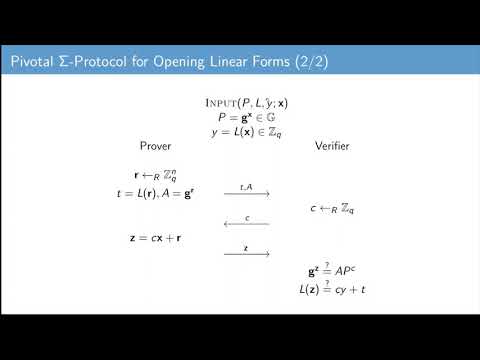Welcome to the resource topic for 2020/152
Title:
Compressed \Sigma-Protocol Theory and Practical Application to Plug & Play Secure Algorithmics
Authors: Thomas Attema, Ronald Cramer
Abstract:Sigma-Protocols provide a well-understood basis for secure algorithmics. Recently, Bulletproofs (Bootle et al., EUROCRYPT 2016, and Bünz et al., S&P 2018) have been proposed as a drop-in replacement in case of zero-knowledge (ZK) for arithmetic circuits, achieving logarithmic communication instead of linear. Its pivot is an ingenious, logarithmic-size proof of knowledge BP for certain quadratic relations. However, reducing ZK for general relations to it forces a somewhat cumbersome reinvention'' of cryptographic protocol theory. We take a rather different viewpoint and reconcile Bulletproofs with Sigma-Protocol Theory such that (a) simpler circuit ZK is developed within established theory, while (b) achieving exactly the same logarithmic communication. The natural key here is linearization. First, we repurpose BPs as a blackbox compression mechanism for standard Sigma-Protocols handling ZK proofs of general linear relations (on compactly committed secret vectors); our pivot. Second, we reduce the case of general nonlinear relations to blackbox applications of our pivot via a novel variation on arithmetic secret sharing based techniques for Sigma-Protocols (Cramer et al., ICITS 2012). Orthogonally, we enhance versatility by enabling scenarios not previously addressed, e.g., when a secret input is dispersed across several commitments. Standard implementation platforms leading to logarithmic communication follow from a Discrete-Log assumption or a generalized Strong-RSA assumption. Also, under a Knowledge-of-Exponent Assumption (KEA) communication drops to constant, as in ZK-SNARKS. All in all, our theory should more generally be useful for modular (plug & play’') design of practical cryptographic protocols; this is further evidenced by our separate work (2020) on proofs of partial knowledge.
ePrint: https://eprint.iacr.org/2020/152
Talk: https://www.youtube.com/watch?v=3wh8Nr5IB9k
Slides: https://iacr.org/submit/files/slides/2020/crypto/crypto2020/31/slides.pdf
See all topics related to this paper.
Feel free to post resources that are related to this paper below.
Example resources include: implementations, explanation materials, talks, slides, links to previous discussions on other websites.
For more information, see the rules for Resource Topics .
